"Who will take care of the corgis?" The mood outside Buckingham Palace
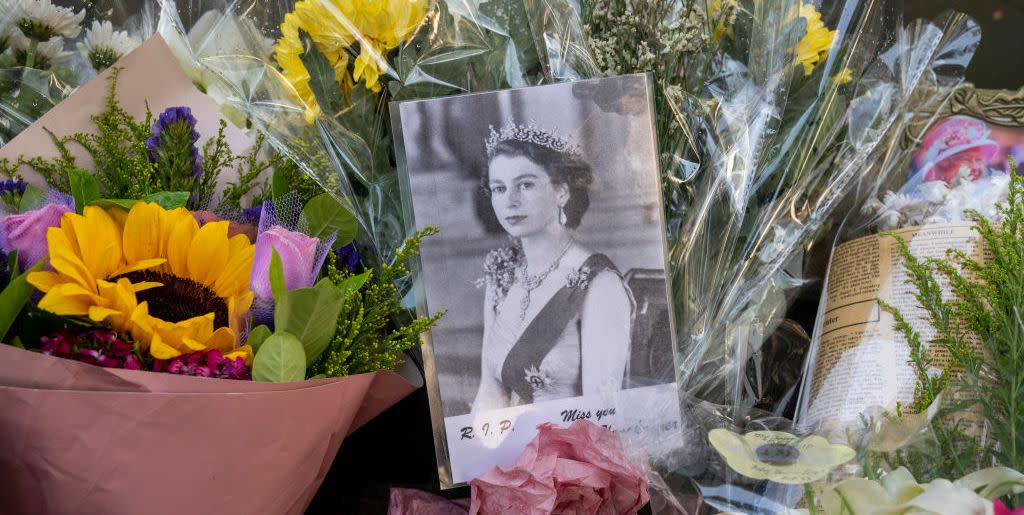
Nula, aged four, wants to know who will take care of the Queen’s corgis now. “I started crying yesterday about it,” she tells me while balancing on the metal railings outside Buckingham Palace. “Who will take care of them? I was worried. I liked the Queen because of her crown and also her dogs. They look like nice dogs.” Nula’s mother Becky says her daughter has been obsessed with the Queen since she was taught about her at nursery ahead of the Jubilee in June. Ever since, she’s wanted to see the Queen and her home. “Sadly, we just missed her,” explains Becky, who travelled to London from their home in a quiet Sussex village. “We were planning on coming today anyway, and then this happened. I’m not a royalist, but the Queen is part of us, she’s part of our history, and I wanted my daughter to understand that. Also, I’m an only female child, and so is Nula. When you see a powerful woman like that, well, it’s a good thing. My aim is to expose her to as many great, powerful women as possible – and the Queen is, sorry was, one of them.”
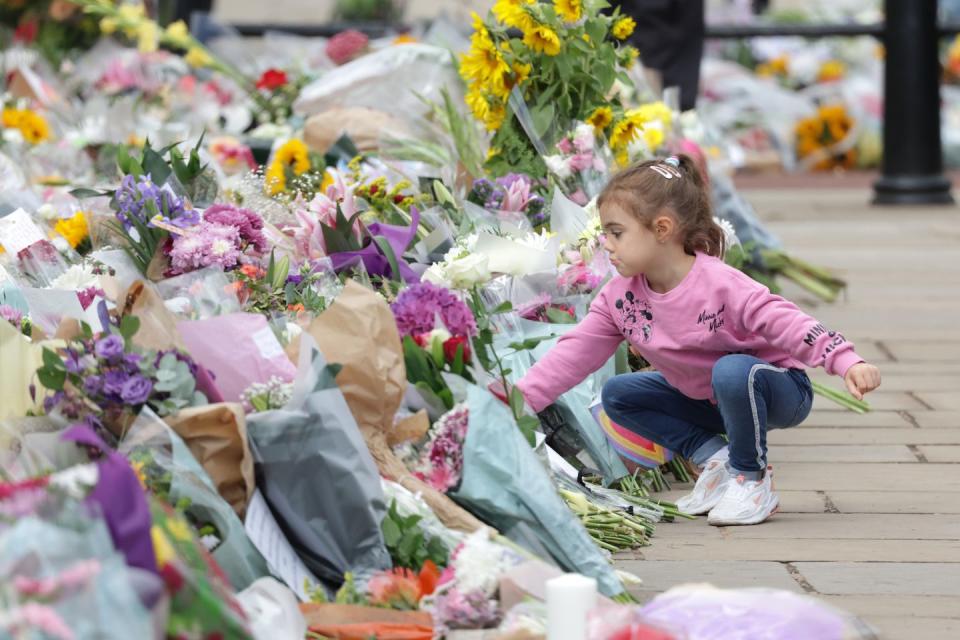
Nula’s initial upset at narrowly missing the Queen was countered by another historic royal moment. “We saw a king!” she exclaims, before pointing out the helicopters circling above. Her mother confirms that they witnessed King Charles III’s car drive past and into the palace grounds: “Everyone started singing ‘God Save The King’. It was really surreal. It’ll take us a while to get used to singing 'king', rather than 'queen'.”
Like Becky, I am not a huge royalist, but I do have respect and admiration for the Queen. There are few rulers who have led their lives with such humility and quiet dedication. There was nothing bombastic about her – she knew what her job was and she did it very well. She knew when to say nothing and when to deliver a speech that would bring a nation to tears. She never got involved with politics, but was an unassumingly brilliant diplomat. She knew how to charm bolshy male leaders, but also how to put them in their place with an artful look. She wasn’t necessarily a feminist, but she was still an incomparable example of female strength and power. Like so many others, who thought themselves to be unconcerned by the royal family, I have surprised myself by how sad I feel about the passing of our queen. How lucky I am as a woman to have grown up knowing that the most famous, powerful person in the world was, in fact, female. Her televised Christmas addresses were the only time in that festive day that my noisy family lowered the volume. She has, and perhaps this is why so many of us feel oddly moved by her passing, always been there. A reassuring, calming presence in a world of chaotic, turbulent politics – a true matriarch. I think it’s wholly possible to see the problems that the royal family represent while still be able to recognise the qualities and service of one remarkable individual.

I wanted to lay flowers at her home because I like the roots of the tradition. The Greeks began the practice of leaving flowers at graves thousands of years ago, believing that if the flowers rooted into ground and grew it meant that that the deceased were at peace. I don’t harbour any illusions that the M&S lilies I laid today will somehow root and grow, but I think if anyone deserved peace and stillness it’s the woman who uncomplainingly worked up until two days before she died. When I arrive at Green Park tube station, it’s busy – not angry commuter busy, but it’s crowded. Everyone is divided into queues (of course we are, our monarch dying has apparently made us all more British than ever), and we are funnelled down the leaf-strewn path towards Buckingham Palace. It is sombre, but not bleak. Those with flowers are told to follow another path through the park to an area specially designated for floral tributes. One of the park volunteers explains that the amount of flowers was so high this morning that another space was needed. “The family comes home today from Balmoral, we need to be able to open the gates,” he says as he strips the plastic cellophane from my bouquet. Every night the flowers laid at the palace will be moved here to this serene space. So, no, we won’t see the same sea of flora that was left for Diana back in 1997, but it has no bearing on the Queen’s popularity.
Instead, tree after tree is propped up by flowers. Towering, seen-it-all oaks are supported and encircled by lilies, roses, alstroemeria and sunflowers in technicolour shades. It is the perfect metaphor for the Queen’s soft power, her ability to rule and persuade through understated diplomacy and charm. Handwritten notes poke out from behind green stems. “Thank you for being there for us all, all those years,” reads one. Another reads, “To the nation’s nan, we’re so sad to lose you, but lucky to have had you for so long.”
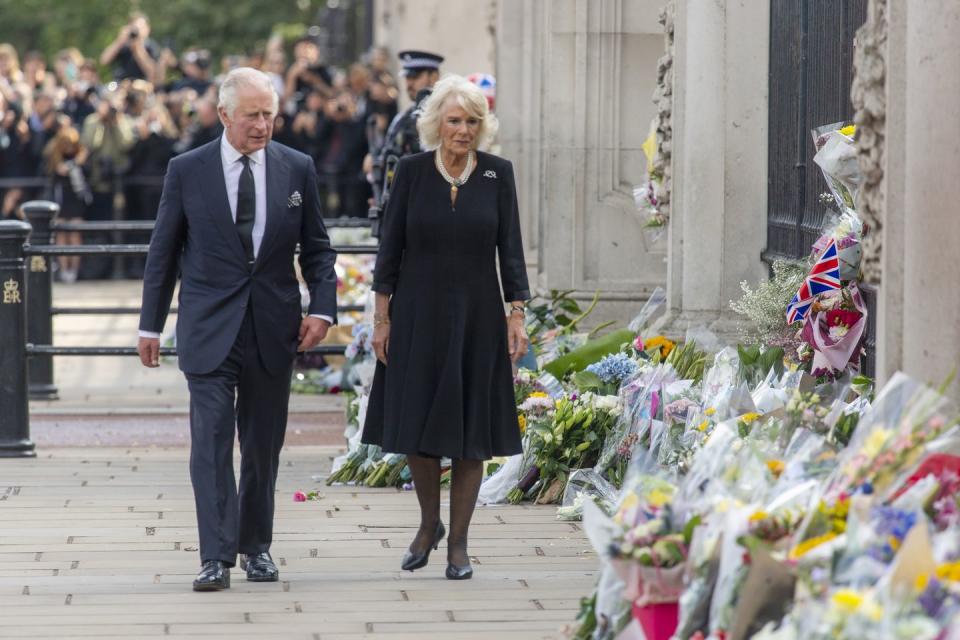
Among those standing round the trees are Bernie and Joan, two sixty-something Australian sisters, who were on route to London when the news broke. They deposited their luggage at the hotel and came straight to the palace to lay flowers. “We love the royals,’ says Joan. “She reminded me of my mother, who was a very gracious lady like her.” For Lauren, in her twenties, it’s about “showing our gratitude; she’s been so constant throughout our lives and we wanted to say goodbye. We’re going through turbulent times so it’s nice to have that figurehead that always felt so comforting. I feel really upset, I was so shocked when I heard the news, even though she was 96.”
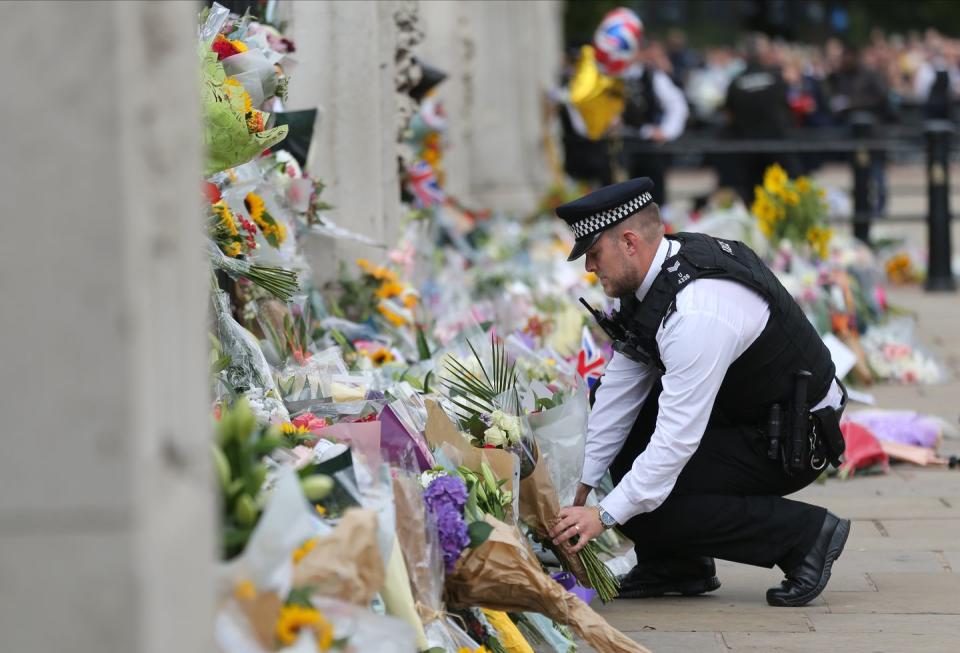
The scene around Buckingham Palace is busier. It’s less reflective, but still peaceful. Someone is playing the National Anthem on their phone. Huge crowds gather round the gates and others lean against railings further back holding their phones to the sky in a bid to get the best shot. There are people here of all ethnicities and ages, from babies to the elderly. Some are tourists, some Londoners, and some have made pilgrimages from across the country. Flowers poke through the wrought iron black gates, others lean against the stone walls. A little boy holds a slightly sad looking rose, whose petals keep falling behind him. He gives it to a police officer to place at the gates, who finds a prominent home for it. Angela, 58, who is there with her husband and daughter, says: “This doesn’t feel like the national horror we all felt when Diana died. It’s more a quiet acknowledgment that someone dear and precious to the country is gone. Her passing has made me aware of how great the monarchy is – having someone who you can respect as a figurehead with largely very good values, who isn’t a politician. I can’t put it into words.”
It’s the famous empty balcony that, oddly, feels the most moving, and the idea that we’ll never see her up there again.
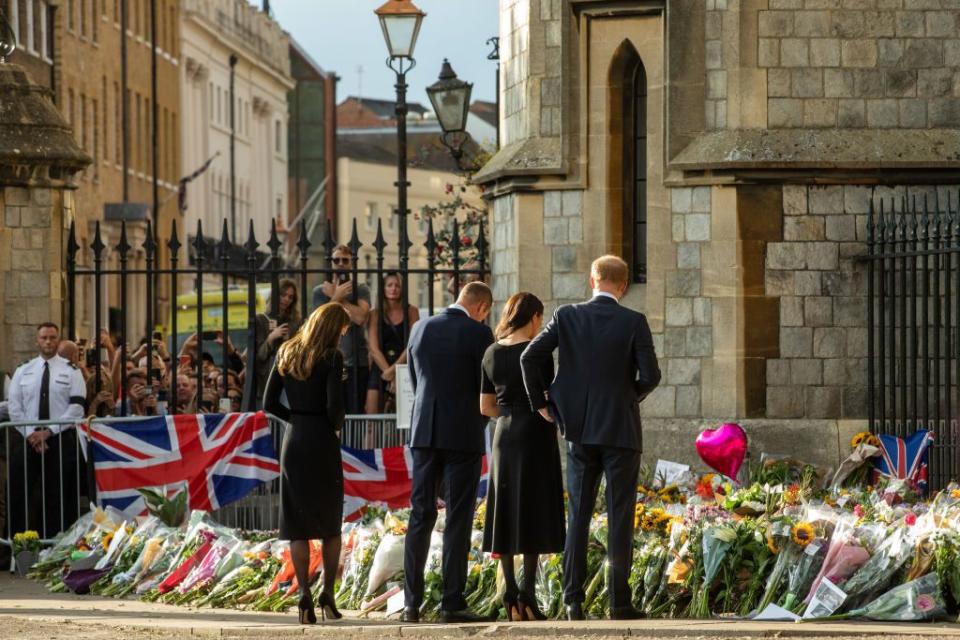
You Might Also Like


